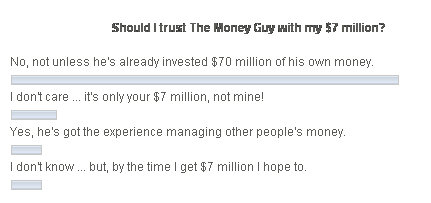 A week or two ago, a reader – who shall remain nameless as they are currently in negotiations – asked for some advice on selling their business:
A week or two ago, a reader – who shall remain nameless as they are currently in negotiations – asked for some advice on selling their business:
I have a software company with a new proprietary software technology. The company is considered for buyout due to the new technology (currently there are no revenues and no debt). The projected total revenues over the next three years is $1.55m (First year: $0.15m, 2nd year $0.4m & Third year: $1m) and total over six years is $4.55m (with 4th, 5th, 6th years at $1m each). What is the right valuation for this company if the company were to be acquired now.
This is a common request that I receive and I always have a soft spot for entrepreneurs, having been down this path a number of times, and I will give you some guidelines in a future post …
… but, in this case Mr X (as I will refer to him) has NO business to sell right now, so the usual formulas simply won’t work!
Why no business?
Well, as Mr X admits, the company has “no revenues” right now: no revenues, no business … no business, no business valuation.
But, Mr X does have a new proprietary software technology; apparently, one that at least one major company wants to acquire.
So, the first step is to recognize that we are selling a product (the “proprietary” rights to a new software technology), but we first need to find out what it would cost to duplicate the technology.
Mr X says: “4-6 months with 2 people on the job”
That puts a ‘lowball price’ on the software of $20k to $100k depending upon whether it is developed onshore or offshore.
Now, that’s assuming that it can be duplicated, but Mr X assures me that it cannot:
All major companies in this area have been trying to figure out an equivalent technology for the last 5-6 years or so, but with no success.
Given that Mr X’s software can’t be copied (6+ years development effort, with NO guarantee of success), then his company is worth whatever he can negotiate 🙂
Since he wanted a better estimate of potential selling price than that, I told him that it’s time to look at potential revenue, which Mr X projects over the next three years as: $1.55m (First year: $0.15m, 2nd year $0.4m & 3rd year: $1m).
If the company generates < $1 mill per year over the next three years, then I think that Mr X would be struggling to get $500k – $1 mill. for it …
… if he is offered less – and, he probably will be as the market is quite small for any major corporate (at the numbers provided above) then, if it were my software, I would be tempted to go ahead and get those revenues for myself then sell in 18 months to 3 years time.
Here’s my reasoning:
1. Development effort on Mr X’s side is tiny, but he feels strongly that his technology can’t be easily copied,
2. Mr X has a market that he feels can generate revenues of, say $1.5m+ over three years (discounted to today’s value), which are relatively small numbers for any substantive corporation.
In fact, if Mr X is offered more that that $500k to $1 mill. that I suggested, it will probably be as a result of a combination of how badly one of these companies wants (needs?) his technology and how big THEY think the market will be for them.
That’s why the next step, if Mr X hasn’t already done so, is to assess what revenues the purchaser believes they can make over the same period (better marketing/sales than Mr X?); better yet, what profitability.
If he doesn’t already have a good feel for these numbers, then he will need to try and get close to somebody on the inside of the company and carefully ask them …
… after all, the price that you set should always be as close to whatever the company that you are hoping to sell to can make, minus a fair margin for their trouble. Anything less, and you are being a little too generous 😉


